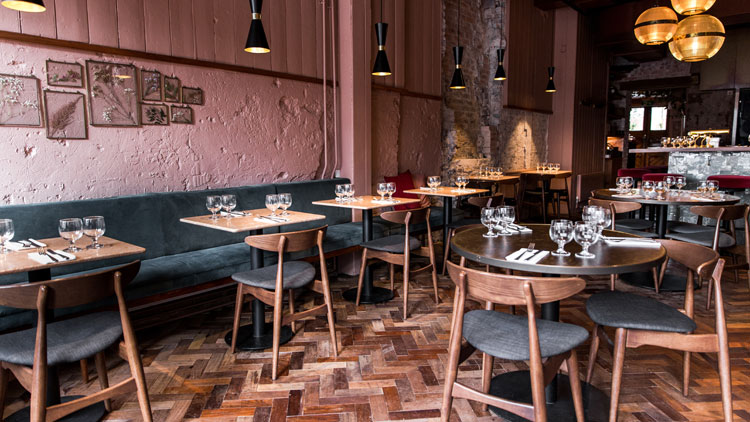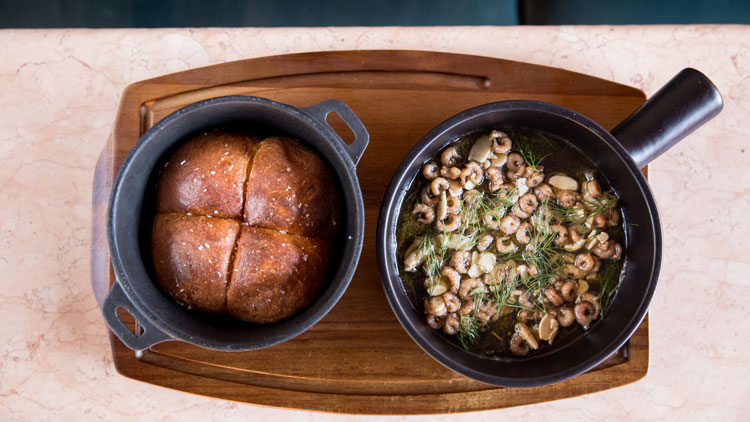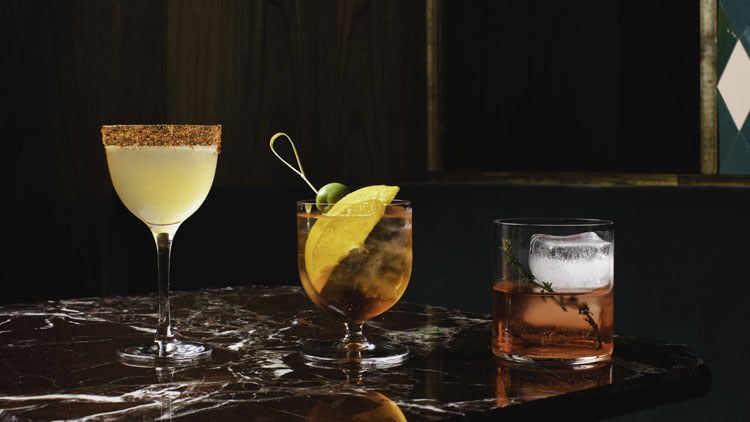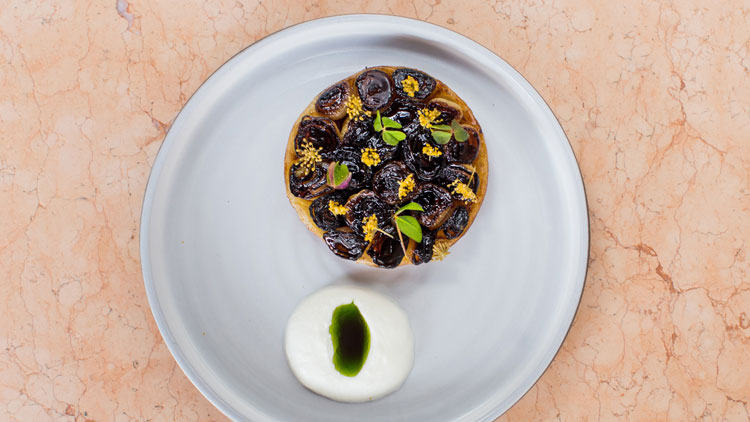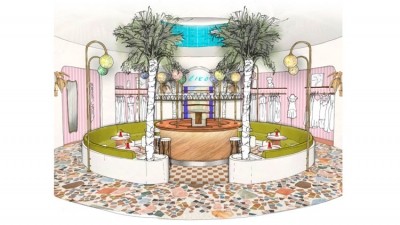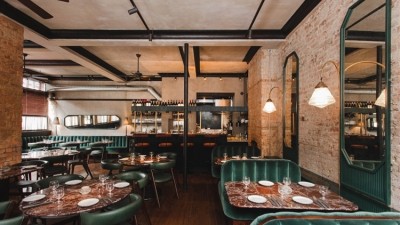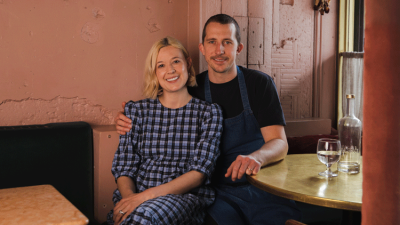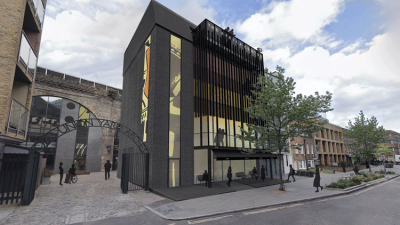Cape crusaders: the Kudu pair on building a mini-empire in Peckham
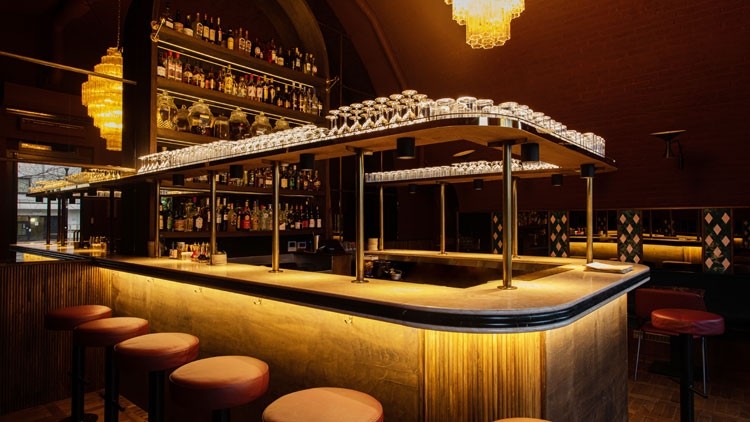
Amy Corbin and Patrick Williams have an enviable commute to work, involving just one flight of stairs. Since late 2017 the couple have lived in Peckham above their debut restaurant – the South African-inspired Kudu – which launched at the start of 2018.
Today, with a second venue just opened and a third due to launch next month, you might think their days of the short hop to work are over. But you’d be wrong. Smokey Kudu, their smart, 37-cover cocktail bar that opened at the end of January, is a mere 50 metres down the road, while their third venture, Little Kudu, a more informal, tapas-style offer, will open next door to the original restaurant. The alarm clocks can remain untouched for now.
This is exactly how the couple want it, they say, when we meet at Kudu, their neat, stripped-back restaurant hours before what is likely to be a characteristically busy dinner service. “We want to be present all the time,” says Williams, Kudu’s South African-born executive chef. “If I’m here, I can quickly pop to Smokey Kudu and then get back to the kitchen. It’s perfect.”
“My dad taught me to be present in the restaurant,” adds Corbin, who previously ran front of house at the restaurant but who now takes more of an operations role. “People feel valued when you’re there and it creates a sense of community. It’s the biggest thing my dad does with his restaurants, and it’s something we do here.”
Such sound parental advice is notable. If the name’s familiar it’s because the father in question is Chris Corbin, one half of the hugely successful restaurant group Corbin & King and someone well qualified to talk about hospitality.
Keeping it in the family
With a successful restaurateur in the family it would seem inevitable then that Corbin might choose to follow in her father’s footsteps, yet this was never quite the game plan. Until a few years ago, Corbin had lived in New York where she studied interior design, but a desire to return to the UK, and to her parent’s home in Clapham, south London, eventually proved too strong. It was here, at a family meal out at Robin Gill’s The Manor [now Sorella] she met Patrick, who was a junior sous chef at the restaurant, and the rest is history.
“I worked 9-5 in design, and Patrick worked opposite hours, so something had to change,” says Corbin, now 31 years old, of the early days of their relationship. “Hospitality is my dad’s industry and I had wanted to go into it in a small way – maybe with a coffee shop or cake shop. But when I met Patrick it made sense to do a restaurant.”
Williams was on the same page. Having worked with Gill, first at The Manor and then later at Paradise Garage in Bethnal Green, where he joined three months after it opened, he had begun to consider his next move. “Being part of Robin’s group, I knew there would be growth in the future, but I didn’t know when,” he says. “Paradise Garage lasted only two years and when it was quiet, I had time to think.” It was during these quieter periods that the seeds of Kudu were first sown.
The pair set about looking to open a neighbourhood restaurant outside of central London, eventually picking Peckham after going out for dinner there one evening and being impressed by the eating out vibe. “We didn’t have a huge budget and we knew we didn’t want to do Clapham, because that was Robin’s domain, so we looked around the area. My brother used to live in Peckham Rye and we couldn’t believe how busy the restaurants were there.”
Describing Peckham’s food scene then as “OK, but nothing extraordinary”, the pair decided to make their mark on the area. Shunning Peckham Rye for the cheaper – and less busy – Queens Road, they took over a former Caribbean chicken shop in August 2017, and opened Kudu six months later.
South African flourish
Two years on and the gamble on Peckham’s less busy area has paid off. To their delight the pair have discovered that the lack of Tube station, rather than being a hindrance as they initially anticipated, means locals tend not to stray too far at weekends. The easy access to Docklands also means the area is now home to a community of young, financially mobile professionals.
As a blueprint for a neighbourhood restaurant, Kudu is pretty much perfect: it offers an intimacy that chimes well with locals yet also has that rare attribute of offering something not available in central London. While the former has helped the restaurant build a loyal local following, the latter has made their bijou Peckham spot an unlikely destination restaurant, with Kudu regularly attracting diners from all over London. “We see a lot of black cabs outside now,” laughs Williams. “You never used to see black cabs in Peckham.”
Much of this can be attributed to the 32-year-old chef’s clever menu of modern European cooking with a South African flourish that is both of the zeitgeist and with an alluring touch of the unfamiliar. “We knew modern European food,” says Corbin. “The challenge was ‘how do we do something different?’. The obvious way was to add in some South African influence.”
“I’ve spent my whole career cooking modern European food,” adds Williams. “In South Africa it’s everywhere, but it’s always fine dining with 10 or 12 elements on the plate and very labour-intensive cooking. When I moved here the change really sparked my imagination. The food on the plate was much simpler and it often looked mediocre, but it was mind-blowing.”
Kudu is not a South African restaurant – of which there are very few in the capital – but rather it follows in the spirit of South African cooking, borrowing flavours and techniques to take the expected and give it a little tweak. Dishes include mussel potjie with curry velvet, new potatoes and monk’s beard; braai onion squash, goat’s curd, dandelion and kale; and peri-peri duck hearts with dukkah and apricot. The influence of working with Gill is evident, but Williams has successfully put his own stamp on the food.
“South African food is a melting pot of cultures and dishes are very spice driven. If you go to Cape Town the Cape Malay food is sweeter curries, stews and a lot of braises. And we do a lot of cooking over fire – that is essential if you are a South African cook. We have a national day for braai (a South African form of barbecuing), which is a public holiday.”
The restaurant’s hero dish, its Kudu bread, is one of the best examples of Kudu’s approach. Served to share with either Cape Malay butter and bacon or melted seafood butter and
baby shrimp (or both), the bread is a nod to the food of the South African vineyard workers who would use the grape must as a bread starter. Kudu’s is a less sweet version, however, spiked with cumin.
Was there a challenge with perceptions at the start, with people thinking Kudu (which is the name of a species of antelope native to South Africa) was a South African restaurant? “There were some people who didn’t get it. In South Africa the food is very meat focused and the portions are enormous and we’re not like that here.”
A successful strategy
Today, the 37-cover restaurant is fully booked most evenings, with the team turning the tables once an evening. Positive reviews by David Sexton in the Evening Standard – “an amazing set of statements about what tastes right”, and by Giles Coren in the Times – “this place is an example of perfect restaurant making” – have helped. Coren’s review came when the restaurant was already a year old and helped maintain momentum.
Being awarded a Bib Gourmand by Michelin in its current guide has also helped. “It was a complete shock, but a very nice one,” says Corbin. “Kudu is an occasion restaurant, it’s not food you eat every day and the cost per head is £45-£50. Being given the Bib helped make people more accepting of paying that.”
Expansion, and the newly formed Kudu Collective, has come off the back of this success. The first opening as part of the collective, cocktail bar Smokey Kudu, was born out of necessity. The second, Little Kudu, more out of serendipity.
Located just yards from the restaurant, next door to Peckham’s Queens Road station, Smokey Kudu launched to accommodate Kudu customers wanting pre or post-dinner drinks. “There are no bars nearby and we were having to suggest they go to a pub, which is often not what people want when they are going out for a nice dinner,” says Corbin. “We had nowhere to send them, so when a space came available, we knew what we wanted to do with it.”
Smokey Kudu is more overtly South African than its older sibling. The bar’s 12-strong cocktail list features creations including the Mandela Libre and the Joburg, with ingredients such as South African brandy, whisky and gin, rooibos and Amarula. “You can go anywhere for a Negroni, so we wanted to do something different,” says Williams of Smokey Kudu’s take, the braai Negroni (mezcal, rooibos, sloe, amaro and thyme).
Descried by Corbin as a “sexier version” of Kudu, its central focal point is a horseshoe bar set against a large antique mirror. Green velvet booths with red marble-topped tables also lend a more polished feel to the room.
Little Kudu will be different again. Located next door to Kudu in what was a seldom-used Chinese currency exchange, it will have a more informal, tapas-bar feel, with floor tiles (Kudu has parquet flooring) and high seating, either in the form of bar stools or high tops of four, which are designed to be shared.
Little Kudu came about after the pair speculatively contacted the landlord to inquire whether the neighbouring premises might be available after noticing it rarely operated as a business. “It always had the shutters down and a person would come once a week, pick up the post and leave,” says Corbin. “The landlord said they had just signed on another 10-year lease, but we sent them an email anyway asking if they would consider selling.”
Six months passed with no word and then, out of the blue, the neighbours responded to say they would give up the lease.
There was a discussion about knocking through to create one restaurant, but the pair decided to create something new, partly to avoid having to extend Kudu’s kitchen and overhaul the restaurant, and partly because they again wanted to do something different. “It made sense to create a space people could just drop in for an hour for a glass of wine and a few snacks. It complements Kudu,” says Corbin. Average spend will be £25-£30 per person.
Little Kudu’s menu will predominantly feature food that can be eaten with the hands. There will be around 10-12 dishes written up on a board that will change regularly, with items to include confit quail lollipops; Devon crab and samphire; braai boodje (a South African cheese toastie) with Wigmore cheese and kimchi; grilled artichokes; and lamb belly with panko crumbs and glazed onions. It will also offer a whole braai fish served with homemade roti that are to be filled and eaten like tacos. The pair have even resisted the temptation to serve Kudu’s signature bread, instead opting for potato flatbread served with smoked fresh curd or smoked mackerel mousse.
The snacking menu will also give them the opportunity to be more playful, they say, with ice cream cones and fried doughnuts also likely to make an appearance.
Three and counting?
With a third venue about to go live, the pair have come a long way in a relatively short space of time. When they opened Kudu, Williams was behind the stove with Corbin running front of house, with three in the kitchen and three front of house. However, a growing business and a new addition to the family have changed how they work, with Corbin now in charge of operations and Williams executive chef. Kudu now employs six out front and seven in the kitchen.
Head chef at Kudu is fellow South African Mark Shier, while Eloise Dawes, who worked with Williams at Paradise Garage, will move next door to head the kitchen when Little Kudu opens.
Many of the staff have been with the couple since day one thanks, in part, to the family-friendly ethos they have created. Kudu closes Monday and Tuesday so everybody can have two days off in succession each week, with every staff member working each shift. When Little Kudu opens it will keep the same hours.
“Work life balance is very important, people value that we are closed Monday and Tuesday,” says Corbin. “Staff have come to us from central London restaurants looking for a nicer pace of work. We are all in on the same day, which creates a sense of family. We don’t just employ people based on whether they can do the job but whether they can fit into the family.”
As the business has grown, has her father imparted any further advice? “He has when I’ve needed it, especially with the new sites, but he also said to me from the start ‘it’s your thing, go do what you want to do’,” says Corbin. “What we do here is very different to what he does.”
And what does he make of it all? “He was initially unsure about the music,” she laughs. “He said it was too loud. But I want Kudu to be like those places in Brooklyn that just feel great.”
With the pair proving to be successful restaurateurs themselves, is there anything her father might have learnt from the younger generation in return? “We’re quite big on social media and we’ve shown him the importance of it,” she adds after a pause. “And they have changed. The neighbourhood places such as Colbert [in Chelsea] now play music, which was something they never used to do.”
As to the future, Corbin says they “definitely want to grow”, but they will see how the new venues bed in first before deciding on the next step. Whatever they do, it will only be neighbourhood restaurants, with the pair counting out doing anything in central London.
“We’ll ride the wave,” says Williams. “And then we’ll take it from there.” For now, at least, they can continue to enjoy a lie-in.
This article first appeared in the February 2020 issue of Restaurant magazine, the leading title for the UK's restaurant industry. For more features, comment, interviews and in-depth analysis of the restaurant sector, subscribe to Restaurant magazine here.

